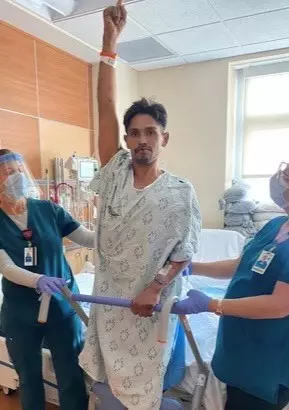- By Jose Luis Dieppa
Choose the health content that’s right for you, and get it delivered right in your inbox.
A Central Florida ballroom dancer has a message for the community after contracting meningococcal meningitis. “This vaccine is out there and it could save them from going through this,” said Rafael Castellano in a recent interview with WESH-2 News.
Rafael has been hospitalized for more than a month at AdventHealth East Orlando. “Right now, I’m fighting for my legs, because I can’t move them. My feet are swollen. And it’s because of the meningitis that I was exposed to,” Castellano said during the interview.
Meningitis is a disease that can cause inflammation around the brain and spinal cord. In severe cases, meningitis can lead to loss of limbs.
“We were told that I was going to die,” he said during the interview. “The doctors told my family to get ready for the worst.”

Rafael believes he is a miracle, and he has faith he will get better soon. “I feel like this is a miracle that’s the only way to explain it,” he said. “And now I have the drive to keep fighting and showing everybody what I’m capable of,” Castellano said.
In April, the Florida Department of Health issued a warning regarding an outbreak of meningococcal disease in Florida. Thus far, the number of cases identified in 2022 surpasses the five year average of cases in the state.
According to the Center for Disease and Control Prevention, the most common symptoms to meningococcal disease include fever, headache, stiff neck, nausea, vomiting, among others.
The meningococcal vaccine is readily available by contacting a health care provider, county health department or retail pharmacy.
Rafael hopes to get back on his feet and start dancing again.
Recent News
-
Health Care
As Thanksgiving approaches, Thais Ordaz reflects on her journey with immense gratitude.
-
Business
Health care and government leaders celebrate the much-anticipated expansion of AdventHealth University.
-
Business
The new grade for fall 2024 is a national recognition for commitment to patient safety.
